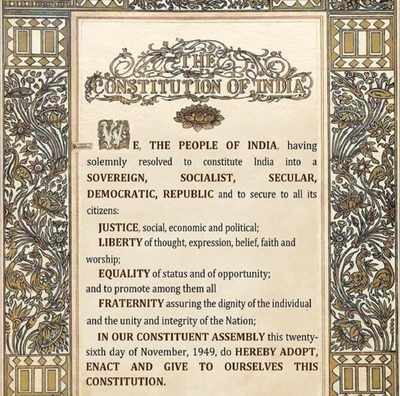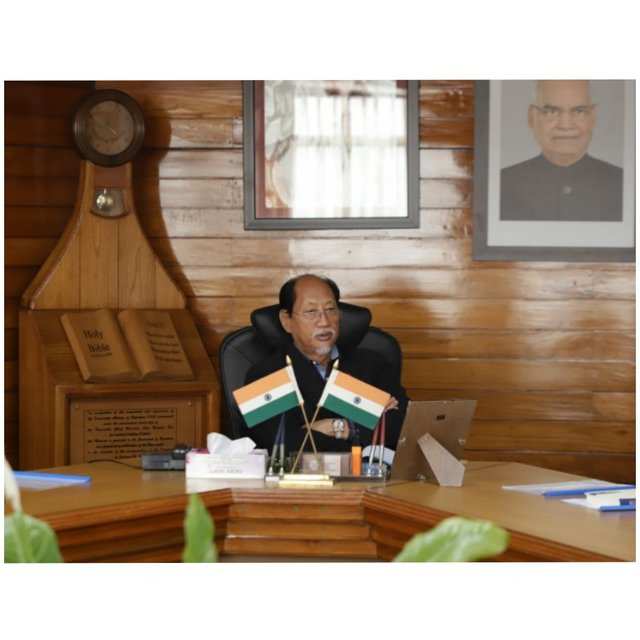The Vice-President Of India
- Vice President:
- Eligibility:
- Part V of the Constitution of India discusses the office of the Vice-President of India. Articles 63 to Article 73 deal with the qualifications, election, and removal of the Vice-President of India.
- Article 63 states that there shall be a vice-president of India
- Article 64 states that the Vice-President shall be the ex-officio Chairman of the Rajya Sabha
- Article 65 states that Vice-President shall act as President in the vacancy of office of the President until the new President is elected.
- Article 66 deals with provision of the Election of the Vice-President.
- Article 67 mentions the Term of Office of Vice-President.
- Article 68 states about the Vacancy of office of the Vice-President.
- Article 69 deals with Oaths & Affirmation by the Vice-President.
- Article 71 deals with matters relating to or connected with, the election of a President and Vice-President.
ARTICLE 63 : THE VICE-PRESIDENT OF INDIA
There shall be a Vice-President of India.
ARTICLE 64 : THE VICE-PRESIDENT TO BE EX-OFFICIO CHAIRMAN OF THE COUNCIL OF STATES
The Vice-President shall be ex-officio Chairman of the Council of States (RAJYA SABHA) and shall not hold any other office of profit:
Provided that during any period when the Vice-President acts as President or discharges the functions of the President under article 65, he shall not perform the duties of the office of Chairman of the Council of States and shall not be entitled to any salary or allowance payable to the Chairman of the Council of States under article 97.
ARTICLE 65 : THE VICE-PRESIDENT TO ACT AS PRESIDENT OR TO DISCHARGE HIS FUNCTIONS DURING CASUAL VACANCIES IN THE OFFICE, OR DURING THE ABSENCE, OF PRESIDENT
(1) In the event of the occurrence of any vacancy in the office of the President by reason of this death, resignation or removal, or otherwise, the Vice-President shall act as President until the date on which a new President elected in accordance with the provisions of this Chapter to fill such vacancy enters upon his office.
(2) When the President is unable to discharge his functions owing to absence, illness or any other cause, the Vice-President shall discharge his functions until the date on which the President resumes his duties.
(3) The Vice-President shall, during, and in respect of, the period while he is so acting as, or discharging the functions of, President have all the powers and immunities of the President and be entitled to such emoluments, allowances and privileges as may be determined by Parliament by law and, until provision in that behalf is so made, such emoluments, allowances and privileges as are specified in the Second Schedule.
ARTICLE 66 : ELECTION OF VICE-PRESIDENT
(1) The Vice-President shall be elected by the members of an electoral college consisting of the members of both Houses of Parliament in accordance with the system of proportional representation by means of a single transferable vote and the voting at such election shall be by secret ballot.
(2) The Vice-President shall not be a member of either House of Parliament or of a House of the Legislature of any State, and if a member of either House of Parliament or of a House of the Legislature of any State be elected Vice-President, he shall be deemed to have vacated his seat in that House on the date on which he enters upon his office as Vice-President.
(3) No person shall be eligible for election as Vice-President unless he –
(a) is a citizen on India;
(b) has completed the age of thirty-five years; and
(c) is qualified for election as a member of the Council of States.
(4) A person shall not be eligible for election as Vice-President if he holds any office of profit under the Government of India or the Government of any State or under any local or other authority subject to the control of any of the said Governments.
Explanation: For the purposes of this article, a person shall not be deemed to hold any office of profit by reason only that he is the President of Vice-President of the Union or the Governor of any State or is a Minister either for the Union or for any State.
The Vice-President shall hold office for a term of five years from the date on which he enters upon his office:
Provided that –
(a) A Vice-President may, by writing under his hand addressed to the President, resign his office;
(b) a Vice-President may be removed from his office by a resolution of the Council of States passed by a majority of all the then members of the Council and agreed to by the House of the People; but no resolution for the purpose of this clause shall be moved unless at least fourteen days’ notice has been given of the intention to move the resolution.
(c) A Vice-President shall, notwithstanding the expiration of his term, continue to hold office until his successor enters upon his office.
ARTICLE 68 : TIME OF HOLDING ELECTION TO FILL VACANCY IN THE OFFICE OF VICE-PRESIDENT AND THE TERM OF OFFICE OF PERSON ELECTED TO FILL CASUAL VACANCY
(1) An election to fill a vacancy caused by the expiration of the term of office of Vice-President shall be completed before the expiration of the term.
(2) An election to fill a vacancy in the office of Vice-President occurring by reason of his death, resignation or removal, or otherwise shall be held as soon as possible after the occurrence of the vacancy, and the person elected to fill the vacancy shall, subject to the provisions of article 67, be entitled to hold office for the full term of five years from the date on which he enters upon his office.
ARTICLE 69 : OATH OR AFFIRMATION BY THE VICE-PRESIDENT
Every Vice-President shall, before entering upon his office, make and subscribe before the President, or some person appointed in that behalf by him, an oath or affirmation in the following form.
ARTICLE 71 : MATTERS RELATING TO, OR CONNECTED WITH, THE ELECTION OF A PRESIDENT OR VICE-PRESIDENT
(1) All doubts and disputes arising out of or in connection with the election of a President or Vice-President shall be inquired into and decided by the Supreme Court whose decision shall be final.
(2) If the election of a person as President or Vice-President is declared void by the Supreme Court, acts done by him in the exercise and performance of the powers and duties of the office of President or Vice-President, as the case may be, on or before the date of the decision of the Supreme Court shall not be invalidated by reason of that declaration.
(3) Subject to the provisions of this Constitution, Parliament may by law regulate any matter relating to or connected with the election of a President or Vice-President.
(4) The election of a person as President or Vice-President shall not be called in question on the ground of the existence of any vacancy for whatever reason among the members of the electoral college electing him.
THANKS FOR READING...........





